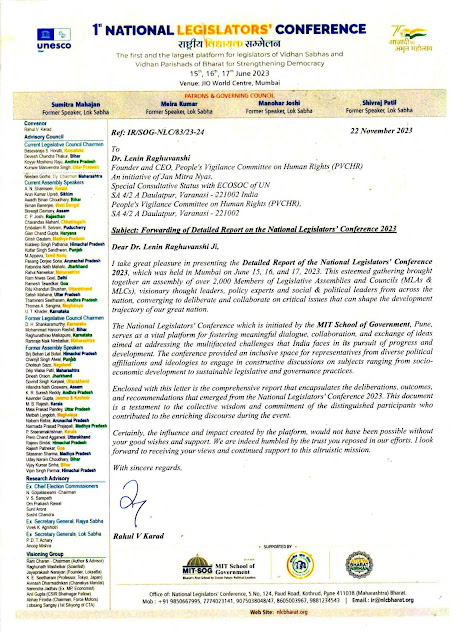In a stellar celebration of unwavering dedication to public health, People's Vigilance Committee on Human Rights (PVCHR) and JanMitra Nyas proudly announce the recipients of the 'Jan Swasthya Mitra Samman' (People Health Friendly Awards). This prestigious recognition is reserved for individuals who have not only championed the cause of implementing Front-of-Pack Labeling (FOPL) for unregulated packaged foods but have also demonstrated their influence through substantial social media following. The awardees – Mr. Parvej Ahmed, Pandit Rakesh Ranjan Tripathi, Shri Shashi Pratap Singh, and Mr. Vikram Pandey – are acknowledged for their outstanding efforts aimed at contributing significantly to reducing deaths attributed to non-communicable diseases (NCDs).
Exceptional Awardees with Social Media Impact:
Mr. Parvej Ahmed – Distinguished Senior Journalist: Mr. Ahmed's influence extends beyond traditional media, with a whopping 32.7K followers on Twitter. His impactful post link not only reflects his commitment to public health but also the widespread support and recognition of his efforts in the online community.
Pandit Rakesh Ranjan Tripathi – Secretary General of Akhil Bharatwarshiya Brahman Mahasabha of UP: Pandit Rakesh Ranjan Tripathi brings his advocacy to the forefront with a significant social media following. His influence within the online space complements his role as the Secretary General of Akhil Bharatwarshiya Brahman Mahasabha, emphasizing the vital connection between awareness and action.
Shri Shashi Pratap Singh – Founder of the Equal Party: Shri Shashi Pratap Singh, with an impressive 11K followers on Facebook, has transformed his platform into a hub for impactful advocacy. His post link not only garners support but also showcases his role as a significant influencer in UP politics.
Mr. Vikram Pandey – Founder of the Indian Roti Bank: Mr. Vikram Pandey, the Founder of the Indian Roti Bank, leverages his influence with a dedicated following. His holistic approach to public health advocacy has created waves online, fostering collaboration among different stakeholders in the fight against non-communicable diseases.
Acknowledging Social Media Impact:
PVCHR and JanMitra Nyas recognize not only the exceptional efforts but also the significant online impact these awardees have had on public health. The impressive number of followers on platforms like Twitter and Facebook speaks volumes about their ability to engage, inspire, and mobilize a broader audience.
The social media influence of awardees like Mr. Parvej Ahmed and Shri Shashi Pratap Singh has turned them into influential champions for further advocacy. Their posts have not only amplified the message but have also created a ripple effect, encouraging broader participation in the cause.
Conclusion:
The 'Jan Swasthya Mitra Samman' not only celebrates the commitment and dedication demonstrated by Mr. Parvej Ahmed, Pandit Rakesh Ranjan Tripathi, Shri Shashi Pratap Singh, and Mr. Vikram Pandey but also acknowledges their prowess as influencers. This recognition is not just a nod to their achievements but a testament to their ability to drive change and awareness in the digital age. PVCHR and JanMitra Nyas extend their heartfelt congratulations to these advocacy stars, heralding a new era of impactful and socially resonant public health advocacy.

















